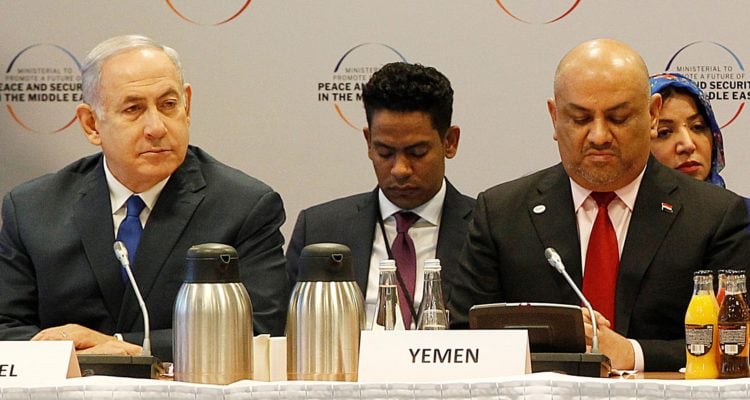At a major Mideast summit in Warsaw this week, Arab leaders said the Iranian threat is the region’s most pressing challenge, dismissing the Palestinian issue’s relevance in comparison.
By Associated Press and World Israel News Staff
Israeli Prime Minister Benjamin Netanyahu’s office on Thursday released a video of a closed meeting in which senior Gulf Arab officials supported Israel’s right to defend itself, played down the Israeli-Palestinian conflict, and described Iran as the greatest threat to regional peace.
The video provided a glimpse into the behind-the-scenes ties the Israeli leader has built with the Arab world, but which are rarely seen in public. The video was recorded on a mobile device and it was not clear who took it. It was removed from Netanyahu’s social media accounts not long after it was posted.
The 25-minute video showed a series of comments made by officials from Bahrain, Saudi Arabia and the United Arab Emirates on a closed panel discussion at a U.S.-sponsored security conference in Warsaw. Some 60 nations participated in the gathering, which was focused heavily on countering Iran’s growing influence in the region.
Bahrain’s foreign minister, Khalid Al Khalifa, made some of the toughest comments, saying that Iran is a far bigger threat to regional security than the long-running Israeli-Palestinian conflict.
“We grew up talking about the Palestine-Israel dispute as the most important issue,” he said. “But then at a later stage, we saw a bigger challenge. We saw a more toxic one, in fact the most toxic in our modern history, which came from the Islamic Republic, from Iran.”
He went on to denounce the “neo-fascist regime” in Tehran, accusing it of plotting attacks in his country and destabilizing Yemen, Syria and Iraq.
‘Every nation has a right to defend itself’
Khalifa continued, “When we come to Israel-Palestine, we had the Camp David agreement. There was Madrid. There were many other ways of solving it, had we stayed on the same path. If it wasn’t for the toxic party [Iran] … [and the] guns, food, [and] soldiers of the Islamic Republic, I think we would have been much closer today in solving this issue with Israel,” Khalifa said, according to i24.
Asked about Israel’s military activity in Syria, the UAE’s Emirati Foreign Minister Abdullah bin Zayed Al Nahyan, commented, “Every nation has the right to defend itself when it’s challenged by another nation.”
Saudi Arabia’s minister of state for foreign affairs, Adel al-Jubeir, also accused Iran of hurting the Palestinian cause by supporting terror groups battling Palestinian President Mahmoud Abbas.
“Who is supporting Hamas and [Palestinian] Islamic Jihad and undercutting the Palestinian Authority?” asked al-Jubeir, before immediately answering, “Iran.”
Netanyahu did not participate on the panel, but is seen sitting in the audience. Speaking to reporters early Thursday, Netanyahu hinted at the “unfathomabl[y]” friendly atmosphere at the conference.
Iran: the greatest regional threat
Israel has identified Iran as its greatest threat. It has vowed to prevent Iran from establishing a permanent military presence in Syria and has carried out scores of airstrikes on Iranian targets in the neighboring country.
“Once the Palestinian issue took center stage. Now [the Arab states] say that first and foremost the Iranian issue needs to be dealt with,” Netanyahu commented to reporters at the conference, according to an i24 report.
“Four out of five Arab foreign ministers who addressed the conference [on Thursday] spoke strongly and clearly against Iran, saying exactly what I’ve been saying for years. They were as clear as possible about the issue, and Israel’s right to defend itself against Iranian aggression,” he explained.
Netanyahu identified the Arab representatives’ mere decision to remain in the room when he spoke, breaking from standard protocol in the past of getting up and walking out when an Israeli leader speaks, represented “the breaking of a taboo.”
“Here you have Arab foreign ministers, who say that Israelis have the right to defend themselves, and don’t say it in secret but on a stage with 60 other countries present,” he added.




